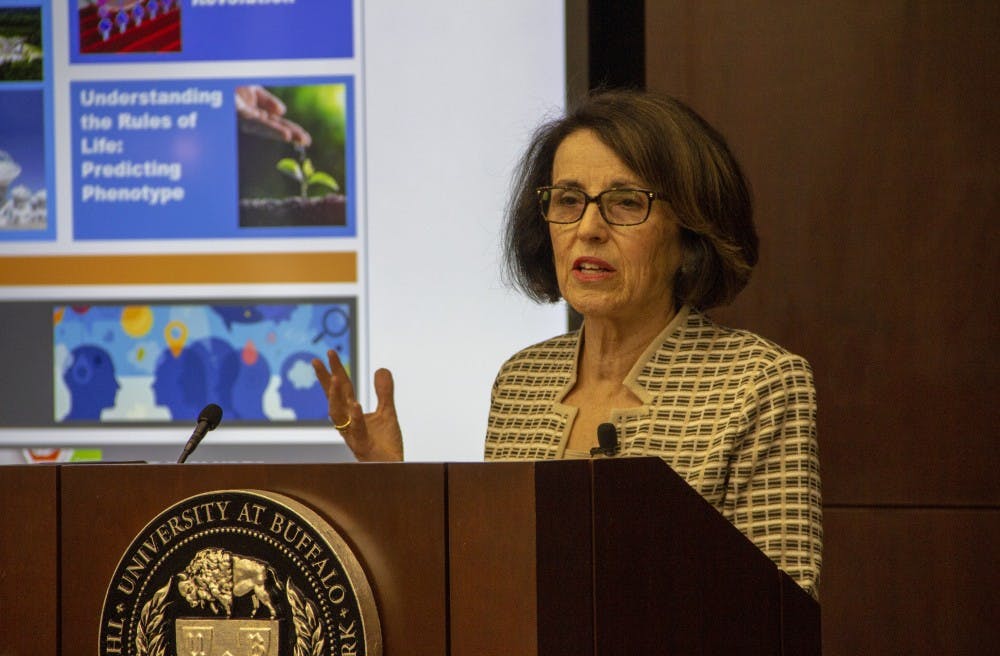Journalist-turned-astrophysicist Dr. France A. Córdova spoke at UB on Wednesday morning.
Córdova, who is the current chief of the National Science Foundation and former chief scientist of NASA, spoke to a packed audience of roughly 200 people in the Buffalo Room. Córdova discussed current innovations within NSF, the importance of reskilling and upskilling and barriers to women in science-related fields.
UB President Satish Tripathi introduced Córdova, who he has known for over 20 years and jokingly described as his “boss’s boss.” Tripathi was the dean of the Bourns College of Engineering at University of California, Riverside when Córdova was chancellor of the university. Tripathi went on to describe Córdova’s extensive career in academia as well as her “brief stint” as a journalist for the Los Angeles Times.
Córdova said she “followed” the footsteps of novelist and journalist Joan Didion twice in her life. First, when she won a competition to be Mademoiselle Magazine’s guest editor, just as Didion did, and coming to UB where Didion also gave a speech.
Córdova went on to speak about the Convergence Accelerator, a pilot program NSF announced just 10 days ago. The Convergence Accelerator is a program that allows for researchers across disciplines to work together from the conception of an idea.
She distinguished this from interdisciplinary research.
“I'm not talking about a biologist producing research and then collaborating with an engineer or physicist to expand on it,” Córdova said. “I’m talking about purposely bringing together intellectually diverse researchers, and even stakeholders from outside the traditional research community to frame questions and figure out how to answer them.”
Córdova introduced three tracks the NSF and Trump administration hope to prioritize by implementing the Convergence Accelerator. These include an open knowledge network, a national talent ecosystem and artificial intelligence in terms of the job market.
The open knowledge network, Córdova explained, was an effort to create databases of scientific knowledge that would be accessible to government agencies, academics, nonprofits and smaller companies. Córdova said the White House called for the creation for the network in 2017. AI is also a Trump administration priority after a January executive order promoted AI research.
The current model of U.S. education and employment, which traditionally relies on “front-loading” knowledge that students learn in college which “carries them through their career,” has changed, according to Córdova.
She said students will now have to constantly learn new skills and work with new technology in order to stay relevant in a job market.
“And I did that once upon a time so I know they can do it,” Córdova said.
The NSF hopes to improve the process for researchers through the Convergence Accelerator, and help workers upscale and re-train while also encouraging private companies to pilot models on a bigger scale.
During the Q&A session, Córdova answered questions about the intense interdisciplinary aspect of convergence and stressed the importance of researchers from different fields finding “common language.” Córdova used an anecdote of her as an astrophysicist falling in love with a geoscientist and not understanding “what he was saying.”
“And so you have to adopt a common vocabulary. People have told us that you can't just give these three year grants, that you're going to have to give us a longer time,” Córdova said.
Córdova also talked about issues with women in STEM and about how the first NASA all-female space walk was cancelled because there weren’t enough space suits to accommodate women.
She also talked about barriers she faced in her own education that dissuaded her from pursuing astrophysics in college.
“The culture in my day was very discouraging,” Córdova, who is now 71 years old, said.
She described growing up in a school where classes were segregated by gender, and recalled how she and four of her classmates wanted to take a physics class.
They were told they could do so only if they found five boys who would take an arts class.
“That’s how segregated these disciplines were,” Córdova said.
Women in STEM fields such as Mira Moukheiber, a senior biological sciences major, said they were inspired by Córdova’s speech.
“I like the fact that she's an impactful woman in a field of science and her contributions and work,” Moukheiber said. “I think she inspires others.”
Córdova also emphasized that English literature still held a special place for her, and writing poetry was a long-time hobby of hers.
“I read poetry, I know poetry, I write as my hobby. And I hope that once I leave this job that I will go back to writing,” Córdova said.
Tanveen Vohra is a co-senior news editor and can be reached at Tanveen.Vohra@ubspectrum.com and on Twitter @TanveenUBSpec.
Tanveen Vohra is a former senior news editor and covered international relations and graduate student protests.






